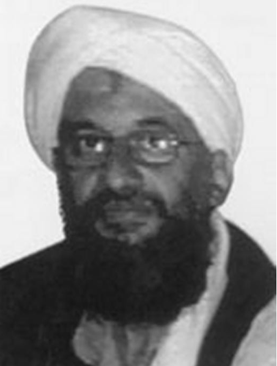Ayman al-Zawahiri
File:President Biden Delivers Remarks on a Successful Counterterrorism Operation (NL1p70RsbnU).webm [[File: Ayman al-Zawahiri (Arabic: أيمن الظواهري) was a prominent figure in the realm of global terrorism, best known for his role as a leader of al-Qaeda, the militant Islamist organization. Born on June 19, 1951, in Giza, Egypt, al-Zawahiri was a surgeon by profession before fully committing to his activities in Islamic extremism. His journey into radicalism began in his youth, leading to his eventual partnership with Osama bin Laden and his rise to the top echelons of al-Qaeda.
Early Life and Education[edit | edit source]
Al-Zawahiri was born into a family with a strong medical and academic background. He pursued a career in medicine, graduating from Cairo University with a degree in surgery. Despite his promising career in medicine, al-Zawahiri was drawn to Islamic activism, influenced by the writings of Sayyid Qutb, a leading figure in the Muslim Brotherhood.
Radicalization and Jihad[edit | edit source]
Al-Zawahiri's radicalization deepened in the 1970s and 1980s. He joined Egyptian Islamic Jihad, a group aiming to overthrow the Egyptian government and establish an Islamic state. His activities led to his arrest and imprisonment following the assassination of Egyptian President Anwar Sadat in 1981. After his release, al-Zawahiri left Egypt, traveling to Pakistan and then to Afghanistan, where he encountered Osama bin Laden.
Al-Qaeda and the Global Jihad[edit | edit source]
In the late 1990s, al-Zawahiri merged Egyptian Islamic Jihad with al-Qaeda, becoming bin Laden's deputy and a key architect of the organization's global jihad strategy. He was believed to be the operational brain behind several major attacks, including the September 11 attacks on the United States in 2001.
Post-9/11 Era[edit | edit source]
Following the 9/11 attacks, al-Zawahiri became one of the world's most wanted terrorists. He evaded capture, releasing numerous videos and writings promoting al-Qaeda's ideology and calling for attacks against Western targets. His messages often criticized the United States and its allies, urging Muslims worldwide to join the jihad against perceived oppressors.
Death[edit | edit source]
Ayman al-Zawahiri was killed in a targeted operation by the United States. His death marked the end of a chapter in the history of al-Qaeda, although the organization continues to operate in various regions around the world.
Legacy[edit | edit source]
Al-Zawahiri's legacy is marked by his role in shaping the modern jihadist movement and his influence on global terrorism. His death dealt a significant blow to al-Qaeda, but the ideology and the network he helped build persist, posing ongoing challenges to global security.
Navigation: Wellness - Encyclopedia - Health topics - Disease Index - Drugs - World Directory - Gray's Anatomy - Keto diet - Recipes
Search WikiMD
Ad.Tired of being Overweight? Try W8MD's physician weight loss program.
Semaglutide (Ozempic / Wegovy and Tirzepatide (Mounjaro / Zepbound) available.
Advertise on WikiMD
WikiMD is not a substitute for professional medical advice. See full disclaimer.
Credits:Most images are courtesy of Wikimedia commons, and templates Wikipedia, licensed under CC BY SA or similar.Contributors: Prab R. Tumpati, MD



